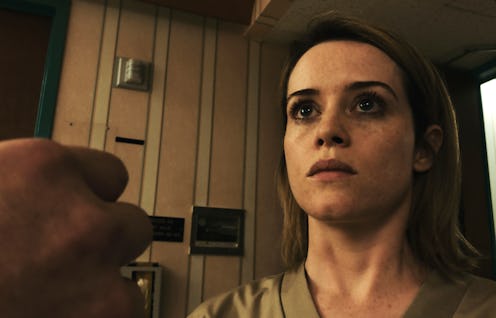Entertainment
How The New Thriller 'Unsane' Gaslights Its Heroine In The Most Dangerous Way

Woe to the female movie character who has to prove herself as "strong" by experiencing unspeakable tortures. Coming just a few weeks after Jennifer Lawrence's Red Sparrow, the new thriller Unsane is the latest film to present a female lead who has to go through trauma in order to gain confidence and be deemed a survivor. Out March 23, the movie about a woman dealing with a stalker attempts to be a commentary on sexism and everyday misogyny, but instead it revels in the very thing on which it's supposedly criticizing.
Spoilers ahead. In Unsane, directed by Steven Soderbergh, Claire Foy stars as Sawyer Valentini, a lonely bank worker whose self-imposed isolation and distance from her family is, at first, unexplained. But when Sawyer seeks out counseling from a local mental health facility, her introverted nature gets some background: she's been the victim of stalking, and so she's moved several states away from her old life for self-preservation. At the facility, Sawyer is interviewed by a counselor, and a few iffy answers about thoughts of suicide or self-harm cause her to be placed in a 24-hour involuntary watch period. 24 hours turns into seven days, and Sawyer's own grasp on her mental health begins to waver the more she's exposed to others who hover on the fringes of stability.
At first, the film seems like it's meant to be a commentary on America's poor treatment of the mentally ill, especially for women. After all, Jay Pharoah plays an undercover journalist who has infiltrated the facility in order to expose the mistreatment of patients and the insurance scams. But it quite quickly becomes evident that Unsane's main interest is actually in putting a woman through horrible tortures in the name of pretending to have something new to say about the horrors of out-of-control misogyny.
Just take Sawyer's stalker. Through blurry visual cues and dramatic camera-phone trickeries, Unsane wants viewers to question Sawyer's rationality and honesty about the situation. But we soon learn that she's completely right to be traumatized, as her stalker has gotten a job as an orderly at her mental health facility using a false identity and really is there to torture her, just like she was afraid of. Paranoia isn't paranoia when one's greatest fears are actually happening. But rather than explore the themes of fear and femininity and the delicate strands of mental health, Unsane exploits Sawyer's situation and gaslights her into believing she's in the wrong to be scared.
Sawyer's stalker is a clear misogynist whose feelings of entitlement to her life, body, and mind will make even the most steel-spined viewer cringe. As Sawyer remains a captive in the facility while her stalker continues to terrorize her, the gaslighting comes into full effect. Yet Unsane doesn't do anything to show that Sawyer is actually stable and that she can be believed; rather, the film continues to suggest that the audience shouldn't trust her version of events, despite us actually knowing the truth.
In the trailers and movie posters for Unsane, viewers are asked, "Is she or isn't she?", referring to whether Sawyer is mentally well or not, as if it's up for debate. And the film's Twitter account claims, "There are two sides to every story," imploring audiences to consider the point of view of a violent man who keeps a woman captive, drugs her, and has intentions of sexually assaulting her. Instead, what the movie should be asking of viewers is if we will stand by Sawyer throughout all the unfair trauma she experiences.
Like Red Sparrow before it, Unsane utilizes the brutalization of women as a way of asserting their strength, as if to say, "Look how resourceful and powerful these women are. They've been through so much, yet they've survived!" Yet both films have little to say about the degradation of their lives or the end result. Sure, both women "survive" their ordeals in the literal sense, although Sawyer is left with PTSD. But the fact that this movie wants us to wonder if she really was unwell all along, when we know she wasn't, undermines anything worthwhile the movie might otherwise attempt to say about mental health.
Watching women go through horrendous acts of violence yet survive in the name of "strength" does nothing for the advancement of female characters in cinema. Gaslighting certainly needs more attention as a form of abuse, but the way Unsane depicts it is a step in the wrong direction. There's got to be more to a film that wants to comment on violence against women than just showing us how easily it can happen.